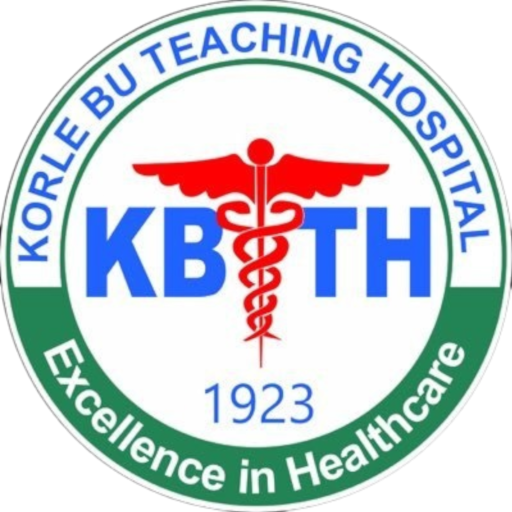About us

The Organizational Culture of Korle Bu Teaching Hospital
The hospital sets out to meet and exceed patients’ expectations of care and at all times treat them with dignity and respect. It also sets out to provide the best possible work environment for its employees, which will enable them to live a fulfilled social and professional life. To achieve this, an appropriate organizational culture, which gives meaning to what we do beyond just coming to work, is required. Culture defines who we are and why we do what we do. The organizational culture of the hospital is premised on the following:
Our Philosophy
The patient comes first, all the time.
Our Mission
Providing excellent healthcare services, training, research and advocacy
Our Vision
To be the preferred tertiary and quaternary
healthcare organisation of excellence
Our Core Values
Patient-centred care
Respect for one another and the rights of our clients
Excellence and innovation
Healthy and safe environment
Excellent stewardship of all resources
Transparency and accountability
Objectives
In pursuit of its mission and vision, KBTH intends to pursue the following objectives that would form the basis/focus of planned interventions (i.e., strategies, programs, and actions):
- To continuously improve the quality of healthcare and enhance client/patient satisfaction in a cost-effective manner.
- To enhance KBTH’s contribution to the MoH’s effort at cost-effective quality healthcare delivery, training, research, and advocacy.
- To improve the technical and managerial skills, knowledge, competencies, and capabilities of all staff.
- To boost staff morale, commitment, and satisfaction through motivation.
- To enhance the hospital’s ability to attract and retain adequate and competent staff.
- To make efficient use of the unique competencies and capabilities of the Medical and other allied health personnel.
- To ensure positive and mutually beneficial relations with external collaborators, donors, NGOs, other organizations, and individuals.
- To improve relations with the general public and immediate community and capacity for Monitoring and Evaluation.
For our valued Clients/Patients, we will:
- Do the right thing, the right way, at the right time.
- Use the right person, with the right skill and right attitude.
- Provide services that meet the patients’ expectations.
- Provide services using the right things.
- Provide services that are value for money, cost-efficient, and cost-effective.
- Provide services that are supported by evidence.
- Partner with others in the interest of improving patient care outcomes.
- Support the community to better manage their health.
- Continuously study and find ways to improve the care we provide.
To our dedicated and committed employees, we will:
- Provide opportunities for employees to function as human beings rather than as ‘just’ resources to be used.
- Provide opportunities for each employee to develop their full potential.
- Provide opportunities for employees to influence the way they relate to their work and the hospital.
- Create an environment in which it is possible for employees to find exciting and challenging work.
- Treat each employee in such a way that their individual set of needs, important to their work and life, are recognized and met.
NATIONAL CENTRES OF EXCELLENCE
There are three Centres of Excellence in the Hospital, namely, the National Cardiothoracic Centre, the National Reconstructive Plastic Surgery and Burns Centre and the National Centre for Radiotherapy and Nuclear Medicine. These Centres attract a sizeable number of clients within the country and from neighbouring countries such as Burkina Faso, Nigeria, Togo and Benin among others.

THE STRUCTURE
The promulgation of the Ghana Health Service and Teaching Hospitals Act, Act 525 of 1996 gave the Hospital the power to operate as a semi-autonomous organisation. It draws direction from a Board which is charged with giving broad policy guidance for the smooth administration of the Hospital. The daily administration of the Hospital is, however, vested in the Chief Executive with assistance from seven Directors. The Directors are for Medical Affairs, Nursing Services, Pharmacy, Administration, Finance, Human Resources and General Services.
Shortly after attaining the semi-autonomous status, the Sub-Budget Management Centre (Sub-BMC) concept was introduced to enhance administrative processes in the departments. By this concept, administrative power is decentralised to the departments referred to as Sub-BMCs.
Currently, the Korle Bu Teaching Hospital has 14 Sub-BMCs, namely, Obstetrics and Gynaecology, Medicine, Surgery, Trauma & Orthopaedics, National Reconstructive Plastic Surgery and Burns Centre, Pathology, Child Health, Polyclinic, Laboratory, Anaesthesia, Radiology, Psychiatry, Accident & Emergency and Allied Surgery Sub-BMCs.


